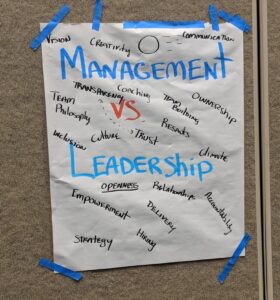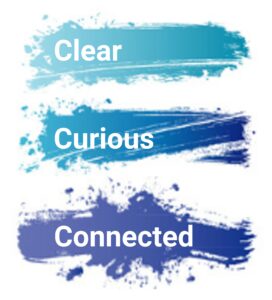 “I want to be a people manager, but I don’t want to manage people.”
“I want to be a people manager, but I don’t want to manage people.”
We’ve never worked with anyone who has said this quite this clearly. Still, some managers we’ve worked with have been ambivalent about the work of management. They have been reluctant to use the authority that comes along with their role. This attitude is understandable, given how little emphasis we’ve seen in organizations on helping managers use it productively and humanely. It’s also problematic. When managers don’t fully inhabit their role, they struggle (and often fail) to set clear expectations, to give productive feedback, to communicate and sponsor effective change, and to support their managers.
Management and Leadership, Not Management Vs. Leadership
At Helping Improve, we see this reluctance to embrace the messy challenge of being a people manager as a symptom of a significant cultural issue around management and leadership. Or, as it’s more commonly framed, “management vs. leadership.” What do we mean by that? Here’s a typical example of how people talk about management and leadership.
You manage things, you lead people. We went overboard on management and forgot about leadership. It might help if we ran the MBAs out of Washington.” – Rear Admiral Grace Hopper, speaking on “Future of Computers, Hardware, Software, and People” at Ohio State University, Feb. 5, 1987.
Or consider this misquotation of the great management thinker Peter Drucker: “Management is doing things right; leadership is doing the right things.” It turns out that Drucker never said that. What he did say was, “Efficiency is concerned with doing things right. Effectiveness is doing the right things.”
These are just two examples of the tendency to demonize and marginalize management instead of helping managers. Even Google’s Project Oxygen – the company’s long-running research to discover what makes managers effective – originally set out to prove that managers don’t matter “based on an early belief held by some of Google’s leaders and engineers that managers are, at best, a necessary evil, and at worst, a layer of bureaucracy.”
Now, we agree that you can’t manage people as though they were mechanical things [1]. Some situations require leadership. But rather than engage in the “Leadership Good, Management Bad” thinking that seems to have emerged in the more than three decades since Admiral Hopper’s comment, we appreciate the difficult and necessary role that managers play in organizations. Good management enables successful leadership in difficult situations. And while not all leaders are managers, effective people managers are also skillful leaders.
Managers Are Overburdened and Undersupported
 When we say “people managers,” we mean individuals who are invested with positional authority by their organizations because of their role. That authority includes hiring, firing, professional development, performance management, and other personnel-related aspects of part the organization. In our experience, people managers in most organizations are overburdened and undersupported.
When we say “people managers,” we mean individuals who are invested with positional authority by their organizations because of their role. That authority includes hiring, firing, professional development, performance management, and other personnel-related aspects of part the organization. In our experience, people managers in most organizations are overburdened and undersupported.
People managers are trusted to be good stewards of the organization’s time, money, and resources. They’re held accountable for certain outcomes. At the same time, they (almost always) want to do right by their people. After all, managers have a tremendous influence over people’s current livelihood and future career paths. When these demands become competing pressures, managers can get stuck between the proverbial rock and a hard place.
While people managers face considerable challenges, they often get little support from their organizations – particularly in tech. We’ve witnessed first-hand talented individual contributors who have been moved into management positions and were told, “You’re smart; you’ll figure it out.” Sometimes, this works out. What often happens is that new managers try to do a good job – and without adequate support, they flail about and unintentionally hurt their people, their organization, and ultimately themselves. It’s easy to forget that management is not a promotion, it’s a change of career.
All of this raises the question, “Who cares about managers?” We do. We’ve been managers, we’ve had managers, and we’ve coached managers. These experiences have given us insight into the role that people managers play and empathy for the position they often find themselves in. We care, and we want to do something about it.
Introducing Managing Amazing People
 We asked ourselves, “How can we help front-line people managers to achieve the results they need with less anxiety?” Managing Amazing People (MAP) is part of our answer. This training course is a natural outgrowth of our Leading Amazing Teams (LAT) class. They share a pragmatic style and an interactive approach. There is overlap, and their focuses are slightly different. We want managers to have top-notch leadership skills. We also want them to excel at management.
We asked ourselves, “How can we help front-line people managers to achieve the results they need with less anxiety?” Managing Amazing People (MAP) is part of our answer. This training course is a natural outgrowth of our Leading Amazing Teams (LAT) class. They share a pragmatic style and an interactive approach. There is overlap, and their focuses are slightly different. We want managers to have top-notch leadership skills. We also want them to excel at management.
Part of helping managers is addressing the difficulties unique to their role, specifically around the effective and humane use of positional authority. Seeing authority as a tool – not one to be overused or abused, but also not to be neglected when it’s the right tool for the job – is a challenge for many of us. This is something that LAT touches on, particularly with its emphasis on alternatives to “telling or doing.” We think it’s important for people managers to go deeper in this area. Using your authority well often requires understanding and coming to terms with your relationship with power and authority.
People managers work through others. They ultimately depend on other people to achieve their goals. Building productive working relationships is a key skill for managers. LAT helps leaders relate to groups and teams in ways that lead to high performance. In MAP, we focus on the one-to-one relationships critical for managers’ success: with their manager, their peers, and their direct reports. As a manager, when you show up as clear, curious, and connected, your interactions with these people are much more likely to be productive. Doing these three things simultaneously is not easy, so in MAP we give you tools and time to practice using them.
Managers work through other people but often feel isolated and alone. Their interactions with their boss, peers, and direct reports can feel transactional and impersonal. In MAP, we help managers reverse this tendency by seeing themselves as embedded in a network of mutual support. People managers need support; the belief that they don’t is a myth. Effective managers know how to give and receive help.
Helping Managers Improve – and Thrive
 If you’re a people manager and this sounds useful to you, consider registering for an upcoming public course. If you still have questions, check out our FAQ.
If you’re a people manager and this sounds useful to you, consider registering for an upcoming public course. If you still have questions, check out our FAQ.
Perhaps you’re a manager of managers, and you need your people managers to more fully inhabit their roles. Consider sending some of them to one of our public Managing Amazing People classes or contact us about private training.
Maybe you know someone who is struggling to deal with the conflicting demands of being a people manager. If so, please pass this information along to them.
At Helping Improve, our emphasis is on helping people with their current challenges. One of the biggest challenges that managers face is being given authority and then being told not to use it. We believe that Managing Amazing People gives managers the tools and practice to tackle this hard – and human – part of their job.
[1] It’s worth noting that “manage” in its modern usage comes from the 16th Century French word “manège” referring to handling a horse. “In this earlier meaning the emphasis is on learning with, abiding with, adapting to, respecting, and working with another complex entity.” If you try to ride a horse as though it were a mechanical thing, it’s not likely to go well.










